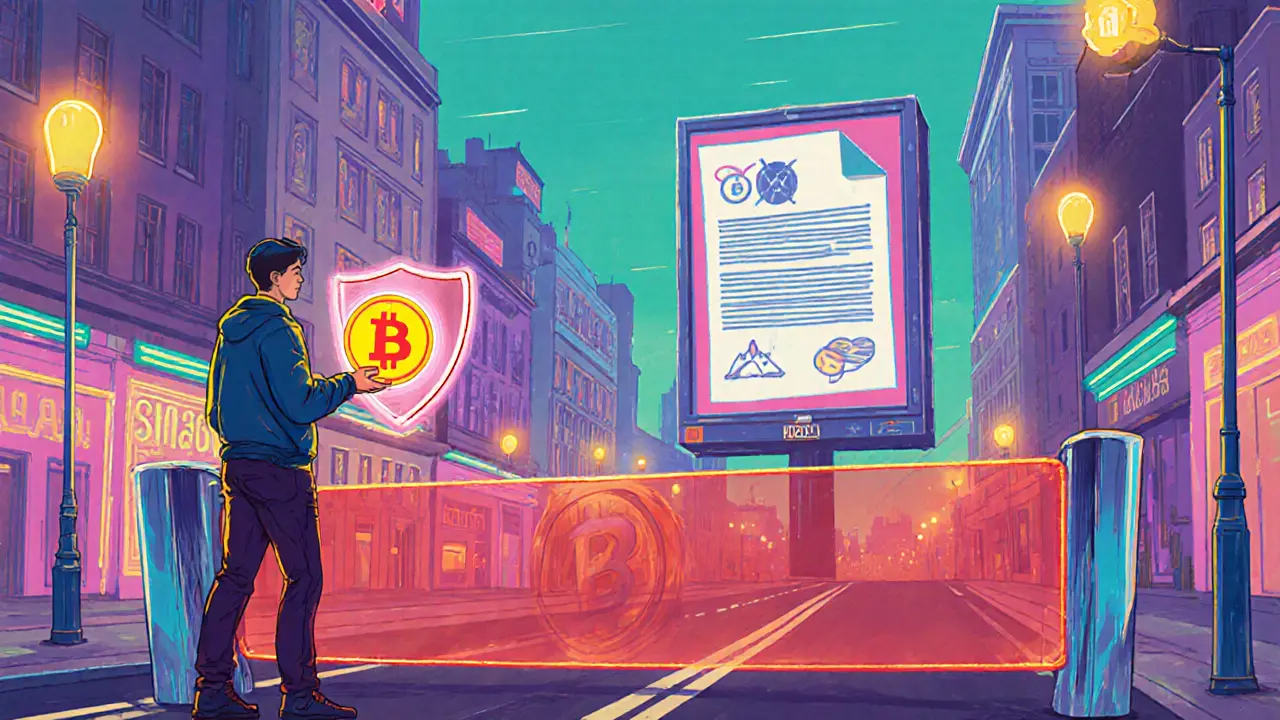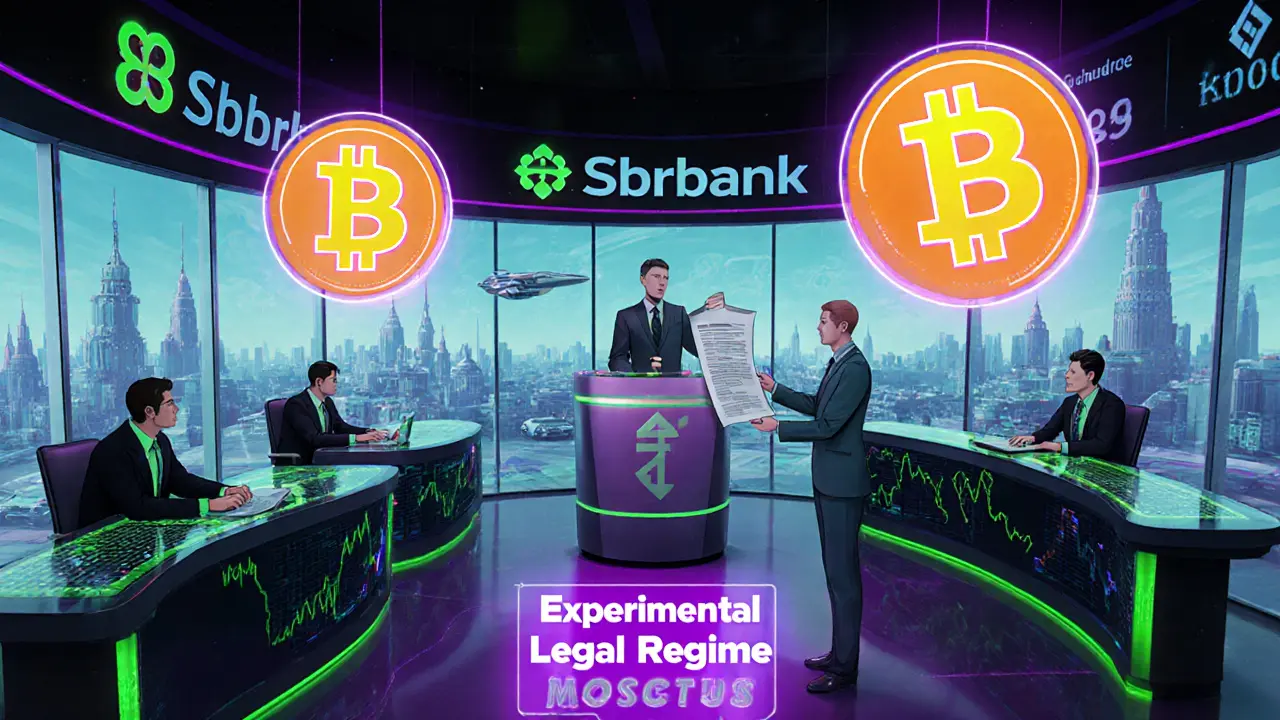Crypto Regulation in Russia: What’s Legal, What’s Banned
 Jul, 12 2025
Jul, 12 2025
ELR Qualification Checker
Check Your Eligibility for Russia's ELR
The Experimental Legal Regime (ELR) is Russia's regulated crypto trading program for high-net-worth investors. Check if you qualify based on the current criteria.
Wondering whether you can legally buy, trade, or use crypto in Russia? The answer isn’t a simple yes or no - the country runs a split‑track system that lets qualified investors play in a regulated market while keeping everyday crypto payments firmly off‑limits. Below you’ll find a step‑by‑step look at the current legal framework, who can actually access it, and what the future might hold.
Legal foundation: the 2020 law that opened the door
Cryptocurrency regulation in Russia is a set of rules that emerged from a July 2020 federal law. That law officially recognized crypto‑assets as property, allowing them to be bought, sold, and held, but it also drew a hard line: any use of crypto for domestic payments was illegal. Enforcement began on 1 January 2021, and the ban on crypto‑payments has stayed in place ever since.
Domestic payment ban - why it matters
The ban means you cannot use Bitcoin, Ethereum, or any other digital token to pay for groceries, rent, or services inside Russia. Merchants caught accepting crypto can face fines, and banks must block any transaction that looks like a crypto payment. The restriction is meant to protect the financial system from volatility and to keep monetary policy under government control.
Experimental Legal Regime (ELR): a controlled playground for the wealthy
The Experimental Legal Regime (ELR) is a three‑year pilot introduced in March 2025 creates a narrow, regulated market. Only “highly qualified” investors can participate, and they must meet strict financial thresholds:
- Individuals: at least 100 million RUB (≈ $1.2 million) in securities or deposits, or an annual income of 50 million RUB (≈ $600 k) in the previous year.
- Legal entities: must hold assets exceeding 500 million RUB.
Those who qualify can trade crypto on licensed platforms, access futures, and even hold crypto‑derivatives offered by banks.
Who’s on the ELR stage? Market players and early activity
Big names have already signed up. Sberbank Russia’s largest commercial bank launched a crypto‑derivatives desk in May 2025, and the Moscow Exchange the country’s primary securities market rolled out a Bitcoin‑futures contract the same month. In the first 30 days, Russian investors bought roughly $16 million of Bitcoin futures, signaling strong demand among the elite.
Political tug‑of‑war: Finance Ministry vs. Central Bank
The Finance Ministry pushes for a looser regime, arguing that lower thresholds would spur innovation. Alexey Yakovlev, director of the ministry’s Financial Policy Department, told the Eastern Economic Forum in Vladivostok that “we believe these criteria can be adjusted downwards”. Meanwhile, the Bank of Russia the nation’s central bank remains defensive, insisting that tight controls protect ordinary citizens from crypto‑related risks. This clash shapes every regulatory tweak that follows.

Compliance heavy‑lifting: AML, KYC, and reporting
Any entity operating under the ELR must follow a robust compliance regime:
- Anti‑Money Laundering (AML) - mandatory reporting of suspicious transactions, especially peer‑to‑peer trades.
- Know Your Customer (KYC) - full identity verification for every investor before they can trade.
- Prohibited activities - banks cannot directly invest in crypto, nor can they use the Russian payment system for most crypto transactions.
- Information exchange - tax authorities receive regular reports on crypto holdings and trades.
These measures aim to keep the regulated segment transparent while pushing the broader public toward the shadow market.
Mining: the one fully legal crypto activity
Unlike trading, crypto mining enjoys explicit legal status. The government created a registry for mining enterprises and introduced a taxation scheme that treats mining revenue as ordinary business income. President Vladimir Putin has encouraged regions with abundant, cheap electricity to develop mining farms, viewing them as a way to monetize idle energy reserves. Boris Titov, the president’s aide on business development, even suggested that the mining infrastructure could later support AI workloads, hinting at a broader tech strategy.
International trade: crypto as a sanctions‑bypass tool
Since 2024, Russia permits the use of crypto for cross‑border settlements. Estimates from the Ministry of Digital Development place the volume of crypto‑based international trade at 1 trillion RUB (≈ $12 billion) in the first half of 2025. This exception helps companies circumvent Western sanctions, and it fuels ongoing lobbying for a more expansive digital‑currency ecosystem.
Digital Ruble: the state‑backed CBDC experimenting alongside private crypto
The Digital Ruble Russia’s central bank digital currency pilot launched in August 2023 with 12 participating banks. By mid‑2024 it had processed over 100 000 transactions through roughly 2 500 wallets. While the Digital Ruble is not a crypto‑asset, it sits at the heart of the country’s broader digital‑finance strategy and may eventually combine with private crypto to form an alternative international payment system, according to Titov.

Key Takeaways
- Crypto ownership is legal, but using it for domestic payments is banned.
- The Experimental Legal Regime offers a regulated market only to investors with >$1 million in assets.
- Large banks like Sberbank and the Moscow Exchange now provide crypto‑derivatives.
- Mining is fully permitted and encouraged as a way to use excess energy.
- International crypto trade is allowed, making crypto a vital tool for sanctions evasion.
Comparison: Domestic Payment Ban vs. International Trade Allowance
| Aspect | Domestic payments | International trade |
|---|---|---|
| Legal status | Explicitly prohibited (2021‑present) | Permitted since 2024 |
| Typical users | None (illegal) | Exporters, importers, large firms |
| Regulatory body | Bank of Russia (enforcement) | Bank of Russia + Customs |
| Compliance requirements | Ban compliance, reporting of violations | AML/KYC, transaction reporting |
| Typical volume (2025) | ~0 | ≈ 1 trillion RUB |
Future outlook: What could change after the ELR expires?
The three‑year ELR ends in March 2028. If the pilot proves successful, the Bank of Russia may codify a permanent framework that could lower qualification thresholds, especially if the Finance Ministry’s push gains traction. Observers expect three possible scenarios:
- Gradual liberalisation - thresholds reduced, more retail investors allowed, but domestic payment ban stays.
- Maintained exclusivity - the regime stays elite‑only, preserving the two‑tier market.
- Full integration with the Digital Ruble - crypto assets become a side‑chain of the state‑backed CBDC, potentially easing payment restrictions.
Regardless of the path, crypto’s role in international trade and mining is set to expand, especially as Russia seeks alternatives to Western financial systems.
Frequently Asked Questions
Is it illegal for a Russian citizen to own Bitcoin?
No. Ownership is legal, but you cannot use Bitcoin to pay for goods or services inside Russia. Holding it is permitted, and qualified investors can trade it under the ELR.
Can I buy crypto on a Russian exchange?
Only licensed exchanges that operate under the Experimental Legal Regime can serve qualified investors. Most ordinary users rely on foreign platforms because domestic exchanges are limited.
What are the tax obligations for crypto mining in Russia?
Mining income is treated as ordinary business profit. Operators must register, file quarterly tax reports, and pay corporate tax on net earnings.
Will the domestic payment ban be lifted any time soon?
There are no concrete plans to lift the ban. The Central Bank sees it as a safeguard, while the Finance Ministry is only pushing for lower entry thresholds for investors.
How does the Digital Ruble differ from Bitcoin?
The Digital Ruble is a state‑issued central bank digital currency backed 1:1 by the Russian rouble, controlled by the Bank of Russia. Bitcoin is a decentralized, unbacked asset whose value fluctuates based on market demand.
Marlie Ledesma
October 23, 2025 AT 15:20This whole split-system feels so weirdly contradictory. Like, you can own crypto but can’t use it to buy coffee? I get the control angle, but it just pushes people to shady workarounds. At least mining’s legit-maybe that’s the real win here.
Kinda sad that only the super-rich get to play in the regulated space. Feels like they’re building a crypto country club while the rest of us get locked out.
Daisy Family
October 24, 2025 AT 05:50Ohhh so now it’s ‘Highly Qualified Investors’? Lmao, what’s next? Do you need a PhD in blockchain and a yacht to trade? 😭
Meanwhile, my cousin in Omsk is mining crypto in his garage with a bunch of old GPUs and paying his rent in BTC. The law? More like a suggestion for people who still believe in paperwork.
Paul Kotze
October 24, 2025 AT 09:00Really interesting breakdown. The mining angle is smart-Russia’s got tons of underused hydro and gas power, so turning that into hash power is genius.
And the international trade loophole? Totally makes sense. Sanctions forced innovation. It’s not ideal, but it’s pragmatic. The real test will be whether the Digital Ruble can coexist with private crypto without crushing it.
Also, big props to the table comparison. That’s the clearest summary I’ve seen yet.
Jason Roland
October 25, 2025 AT 06:16Why is the central bank so scared of retail access? If you’re going to let billionaires trade Bitcoin futures, why not let normal people buy $100 worth? You don’t protect people by keeping them in the dark-you protect them by educating them.
This whole thing feels like a power play disguised as regulation. The Finance Ministry’s right-lower the门槛. Let the market decide. If people get burned, they learn. But right now? It’s just creating a two-tier system where the rich get to play and everyone else gets to gamble on the dark web.
Niki Burandt
October 26, 2025 AT 01:47So… you can’t pay for a pizza with Bitcoin, but you can buy $10M in Bitcoin futures? 😂
Classic. The rich get to gamble with regulation’s blessing. The rest of us? We’re just ‘potential money launderers’ waiting to be flagged. 🤷♀️
Also, mining = good. Crypto payments = evil. So… mining is basically legalized electricity theft? 🤔💎
Chris Pratt
October 26, 2025 AT 02:23Respect the nuance here. Russia’s playing chess while the West is still stuck on checkers.
Using crypto for international trade? Brilliant. It’s not about rebellion-it’s about survival. And mining as infrastructure? That’s forward-thinking. Not everything has to be ‘decentralized or bust.’ Sometimes, controlled innovation works.
Also, the Digital Ruble isn’t crypto, but it’s the bridge. That’s the real story here.
Karen Donahue
October 27, 2025 AT 01:05I just don’t get how anyone can defend this system. It’s like saying, ‘You can own a gun, but you can’t shoot it unless you’re a licensed military contractor.’ What’s the point? Why even allow ownership if you’re going to make it useless for 99.9% of people? It’s not regulation-it’s psychological control. They want people to think crypto is legal, so they don’t riot… but they never let them actually use it. It’s manipulation dressed up as policy. And now they’re calling it an ‘Experimental Legal Regime’? Please. It’s a luxury spa for billionaires while the rest of us get stuck in the mud. And don’t even get me started on how this just fuels black-market exchanges. The whole thing is a farce.
Also, the Digital Ruble? Please. It’s just a surveillance tool with a fancy name. You can’t call that innovation. You can call it authoritarianism with a UI upgrade.
Bert Martin
October 27, 2025 AT 11:35Great post. Really breaks it down without the hype.
One thing to watch: if the ELR expands even a little after 2028, we might see a whole new wave of Russian crypto talent emerge-developers, compliance officers, fintech startups. Right now, it’s locked up, but that’s exactly how innovation starts-behind closed doors.
And mining? That’s the quiet hero here. It’s not flashy, but it’s building real infrastructure. Maybe in 5 years, Russia’s mining rigs are powering AI farms that serve global clients. That’s the kind of long game I respect.